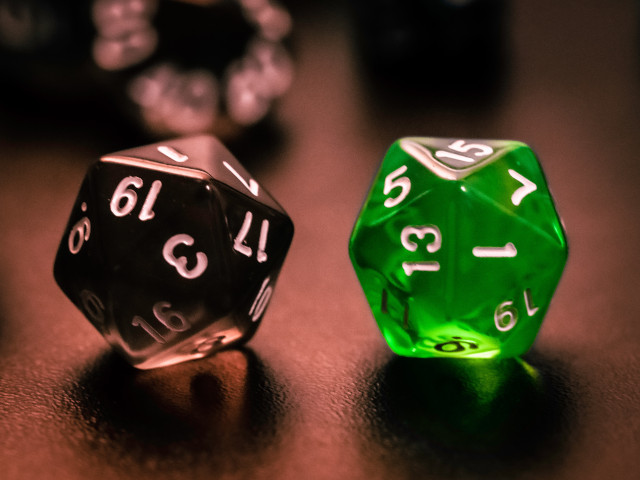Ethan Northey on collaborative writing.
The table is strewn with Jaffa cake remnants, pizza, and vegan stir fry. Voices and the clatter of dice clamber wildly over and under each other as the room debates the best way to escape a crumbling tower. My character is currently unconscious. I am a nervous wreck in the corner, strictly occupying the very edge of my seat. I listen as new friends try to figure out a way to save me. While not a singular bolt of epiphany, it was in moments like this that I began to realize that roleplaying games are the storytelling outlet I had been craving all my life.
I came to Dungeons and Dragons in my mid-twenties and will always remember my first game. I had found a group online, and in the days prior, my social angst was in overdrive. Obsessing over remembering the rules, what dice I needed to bring, and most worryingly of all, the panic of walking into a room full of strangers and having to pretend to be a wizard for the next three hours. Since then, I have played every week without fail.
To the uninitiated, in its most basic form, the game revolves around a dungeon master presenting scenarios, and the other players, through roleplay, offering solutions. Dice are then rolled. These, along with the dungeon master, officiate an outcome. A new scenario arises, and the game goes on. No loading screens, the book doesn’t finish. Death isn’t the end, and there are no high scores.
Tabletop games have given me a practical empathy. A way to inhabit personas to a degree I had previously not thought possible having always felt a distance between myself and my characters. Recounting previous D&D adventures, however, is an exercise in the first-person singular and plural. Remember when we infiltrated that cult? Remember when you saved me from the ruined tower?
Dungeons and Dragons is built from the communal cannon of trope and pop culture. The quests of Tolkien, the horror of Lovecraft. This makes it a perfect place to explore storytelling functions, plot, and narrative structure. The players construct a tale together, and that thrives on common ground. For me, as an aspiring writer, there is no better way to explore familiar stories. A powerful merchant hoards riches untold? Hire a crew and begin a heist. Our companion is slain in cold blood? A revenge quest is born. The farm of my birth is burnt down? A hero’s journey begins.
Playing pretend becomes less of a respected activity as we age, and adults have very few avenues for social play. I think this is broadly a shame to all grownups everywhere and, more specifically, a huge detriment to writers—those in the business of making things up and writing them down. Accurately communicating our imagination is integral to the craft, and the framework of a game frees us from blank word documents and judgmental notebooks. By gamifying imagination and emphasising improvisation D&D offers something that writing alone cannot. Lucid, immediate, free-flowing story devoid of self-doubt, retractions, and wastebins brimmed with balled up first drafts.
Writing is often isolating, and when trying to ache out words, the page can feel far removed from the story. Feedback only offered by long-suffering partners pressganged into being a test audience. Within a shared safe space of concrete imagination, however, responses are instantaneous. Like any good story, the artifice of page or rules quickly falls away. I feel down in the dirt, working with friends building a narrative, sharing in treasures, triumphs, and failures. The fundamental writing question of ‘what happens next?’ is still being begged only within communal roleplay I do not feel so alone in answering it.
